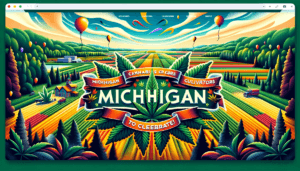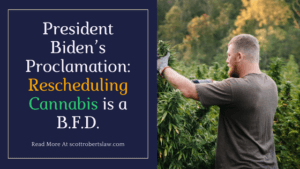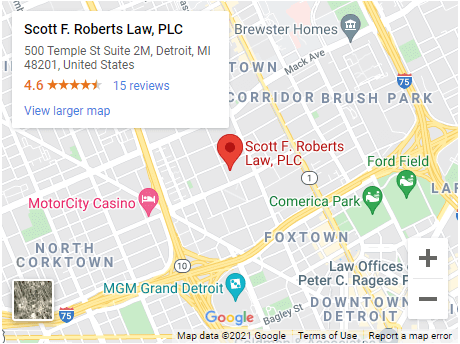As a cannabis attorney, you hear many horror stories from hemp and marijuana licensees. These horror stories can range from massive safety testing failures, incorrectly designed cultivation and processing facilities, and pest infestations and crop failures. While attending the NoCo Hemp conference in Colorado, there was one story in particular that seemed to stand out from the rest, not just in terms of the frequency, but also in terms of catastrophic results.
One such horror story from the out-of-state hemp and marijuana market will likely play out in Michigan for those who are not aware of the problem this can cause. While I’ve heard several variations, the basis of the story is as follows: A marijuana licensee is growing marijuana outdoor. Unbeknownst to them, a neighbor—either on a property directly adjacent to them or, in some cases, a property as far as five miles away, decides to grow hemp outdoors. The result is that the marijuana licensee’s cannabis crop cross-pollinates with the neighbor’s hemp crop, and the marijuana licensee’s crop is virtually ruined or at the very least filled with seeds.
This scenario will almost assuredly play out here in Michigan since Michigan has created two separate licensing programs with no coordination between the two programs or even the departments that administer them. Michigan’s Department of Agriculture and Rural Development (“MDARD”) is currently granting hemp cultivation licenses for agricultural land throughout the state, whereas Michigan’s Department of Licensing and Regulatory Affairs (“LARA”) is granting marijuana cultivation licenses for outdoor farms.
While municipalities can restrict where outdoor marijuana farms are located, they cannot currently restrict where hemp farms are located. MDARD has not indicated that it plans to restrict where outdoor hemp cultivation takes place, and LARA also is not restricting where outdoor marijuana cultivation takes place. With nothing to stop hemp and marijuana from growing in nearby farms, the result will be low quality, seedy marijuana and “hot” hemp crops that will need to be destroyed under state law.
Cross Pollination
Generally speaking, there are two types of cannabis—marijuana and hemp. The main difference between the two plants, at least as far as the law is concerned, is the concentration of THC found in the plant. Cannabis Sativa with more than 0.3% THC is considered marijuana, whereas Cannabis Sativa with less than 0.3% THC is considered hemp. Otherwise, marijuana and hemp are the same species and can easily interbreed with one another.
This becomes a problem because they can cross-pollinate one another, and each has been bred over decades, if not centuries, for a specific and entirely different purpose. Put simply, marijuana is essentially hemp that has been carefully bred over generations to have a high THC content and to produce the sticky, crystallized buds that consumers have come to enjoy. If a male hemp plant pollinates a marijuana plant, the result is a cannabis flower that is full of seeds, low in THC, and virtually worthless on the open market. Hemp goes to seed very quickly and therefore has the ability to quickly pollinate any marijuana plants growing nearby. This can pose a huge risk for outdoor marijuana cultivators since a few unfortunately placed hemp plants can ruin their entire crop.
While I have heard about this happening several times, one specific story that stood out was where a hemp crop five miles away ruined the entire valley’s marijuana crop on a particularly windy day. The outdoor marijuana crop was worth several millions of dollars. Needless to say, the marijuana cultivators were up in arms at the hemp cultivator, who may not have even been aware that all that was needed was one particularly windy day to send pollen from his farm to marijuana cultivation facilities five miles away. There have even been reports that hemp planted as many as 20 to 30 miles away from outdoor marijuana cultivation facilities has pollinated marijuana crops, resulting in lower quality marijuana flower that contained numerous seeds.
No Legal Way to Prevent Neighboring Hemp Cultivation
While the state of Michigan is working on a plan to be submitted for approval under the 2018 Farm Bill, the state is currently accepting applications under its 2014 Industrial Hemp act. Hemp cultivation is controlled by the Michigan Department of Agriculture and Rural Development, meaning municipalities have no more control over hemp farming than they do over corn or soybean farming.
This could have particularly disastrous results for outdoor marijuana cultivators in Michigan. They have no legal way to stop their neighbors from cultivating hemp and thus possibly ruining their outdoor marijuana crop. That means an outdoor medical marijuana facility that took over a year to site, license, build a facility, and put plants in the ground could have their entire operation rendered utterly useless by a nearby farmer who decided to plant an acre of hemp on a whim.
Similarly, hemp that cross-pollinates with marijuana will almost certainly become “hot”, which is the industry term for having more than the allowable 0.3% THC. A hot crop would be considered marijuana in Michigan and would need to be immediately destroyed, otherwise the hemp farmer would be at risk of being prosecuted under Michigan’s marijuana laws. This seems to be a particularly glaring hole in Michigan’s cannabis laws, as these two types of Cannabis simply do not mix well when both grown outdoors, but there are no regulations governing their proximity.
What’s an Appropriate Distance?
With reports of hemp pollinating marijuana plants over twenty miles away, at what distance should an outdoor marijuana cultivator worry about a nearby hemp field? Hemp, while generally pollinating by the wind, can also pollinate by bees, who can fly hundreds of miles to pollinate another plant. So should a Michigan outdoor marijuana farmer worry about hemp fields tens or even hundreds of miles away?
To answer this question, I conducted a cursory review of some of the academic articles written about this topic in other states. Generally, it would seem that about 10 miles can be a safe distance, assuming there are adequate windbreaks between the two farms. Many experts believe that this distance may actually be playing it overly safe, and a distance between 3 and 7.5 miles would be a safe buffer unless there is open water or open fields separating the two farms. If two farms were sitting on opposite sides of a bay, for example, this buffer distance may increase to 30 or more miles.
Regardless of the exact buffer, this issue will pose a problem with Michigan cannabis farmers, whether their focus is on hemp or on marijuana. Since both have a right to legally plant their crop, there are no clear legal remedies for a marijuana farmer to prevent a nearby hemp farmer from growing industrial hemp, or vice versa.
Given the absence of any available legal remedies, the best advice I can give to outdoor marijuana and hemp cultivators is to simply be good, friendly and watchful neighbors. If you hear about a nearby farmer looking to plant hemp or marijuana near your field, I’d recommend starting a conversation with him or her. Neither of you may be willing to budge—which could lead to an unfortunate game of chicken—but it may be possible to work together to at least mitigate the possibility of significant cross-pollination through timing the growing cycles and adding additional windbreaks. Addressing the problem with your neighbor, even if the solution isn’t perfect, is certainly a better strategy than burying your head and hoping for the best.
Scott F. Roberts is a Michigan Cannabis Attorney and Hemp Attorney representing both outdoor hemp and marijuana cultivators. He is the managing partner of Scott F. Roberts Law, a boutique Cannabis and Hemp law firm in Detroit. Mr. Roberts is also an attorney with McAllister Garfield, a national marijuana and hemp law firm with its own devoted Hemp and CBD practice group.




